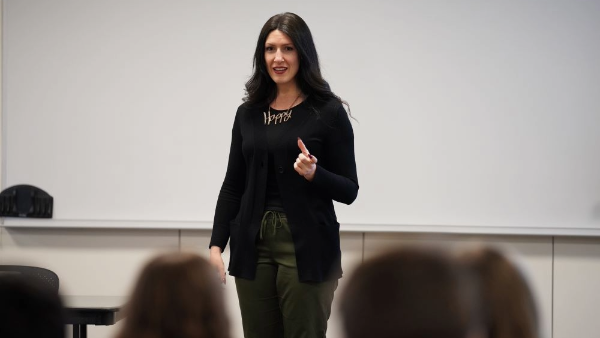While it’s common for students to seek an internship after their junior year of college, Interim Director of Career Services Veronica Stewart has been noticing something a little different.
“Each year, we see more and more first-year students come in ready for a professional internship,” says Stewart.
The Amica Center for Career Education helps students at every stage of their academic career — whether it’s choosing a major, finding an internship, or landing a job. The center’s career coaches work with students from the start of college up to five years after graduation. With their help, students locate opportunities, develop application materials, prep for interviews, and learn how to market themselves.
Stewart explains that internships allow students to develop 21st century skills and help them discover what they like or dislike about a career.
“With each year that goes by, internships are more and more vital for students who want to enter the workforce after graduation or even go to graduate school,” she says.
In preparation for a student’s next internship, Stewart shares four tips on how individuals can have a successful experience and increase their chances of being invited back to work with an organization.
1. Be willing to speak up
Stepping into a new environment can be intimidating, especially if students go into an internship feeling like they don’t have the confidence to excel because the experience is new to them.
Stewart reminds interns that their new colleagues already view them as professionals who are on their level. Therefore, individuals should be confident in speaking up to ask questions or share ideas; this attitude shows the company that an intern cares and is invested in the organization.
“No one on an intern’s team knew exactly what their job looked like before they got there and experienced it for themselves,” Stewart says. “All interns and all new employees are in the same boat and should be confident — no questions are silly questions. If you are really unsure of what the boundaries might be, ask a direct supervisor what those are.”
2. Get to know other people
Interns should put themselves out there by talking to people from other departments. These connections will help them understand how various sections of the company work together while also allowing students to build a network of people to stay in touch with for the future.
Stewart says individuals can get to know people by setting up meetings with employees who hold different levels of authority. Some general conversation starters include asking about their career paths and the organizational initiatives they find most important.

3. Do more than what's asked
Employers want to see that students are equipped with 21st century skills (e.g., critical thinking, leadership, communication), which are practiced and demonstrated through internships. Stewart suggests interns occasionally ask, “How else can I help?” so interns have the chance to show off additional talents they bring to the team.
“This type of initiative shows you care about the success of your team and the organization; it implies that you would be a dedicated full-time employee in the future,” Stewart says.
4. Continue to discover
According to Stewart, Bryant students are very active outside of the classroom. Seventy-five percent of students from the Class of 2022 completed at least one three-credit internship while 37 percent participated in two or more. She says that number rises close to 100 percent when non-credit internships and experiential education opportunities that students participate in at the university are included.
“One internship could be all a student needs to make great decisions and develop contacts for their full-time job,” Stewart says. “But many students really need to see a couple of work environments to make an informed decision about what's right for them.”
If students are looking for additional internship or experiential learning opportunities, she suggests individuals job shadow an alum or attend one of the university’s trips where they tour companies and meet employers. Stewart notes that the Amica Center also offers personal strategies for embarking on experiential education and there are now opportunities for students to earn academic credit and digital badges through the university’s Vision 2023 initiatives.